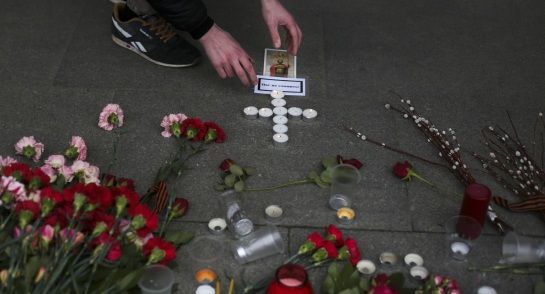
Concerns mount over Kyrgyzstan being breeding ground for terrorists
Russia’s subway bombing, carried out by a suspected Kyrgyz-born Russian citizen, has again cast concerns on worldwide terrorism associated with the Central Asian nation of Kyrgyzstan.
Monday’s attack in St. Petersburg follows terror incidents in recent years, like the 2013 Boston Marathon bombings — carried out by Chechens who grew up in Kyrgyzstan — and an Istanbul airport attack last June in which one suspect was Kyrgyz.
Although Russian officials suspect that alleged attacker Akbarzhon Dzhalilov had no links to the Islamic State group, there is speculation among investigators that the bombing was in retaliation for Russia’s military involvement in Syria’s civil war, including attacks on IS targets in Syria, according to Russian media and Kyrgyz officials.
Along with neighboring Central Asian countries, the landlocked state of six million people has been a breeding ground for terrorists who have joined Islamic State and other militant groups on the battlegrounds of Iraq and Syria, analysts say.
According to government statistics and groups that monitor terror, more than 500 people — including 121 women — have left Kyrgyzstan to fight in Syria and Iraq since 2014. Dozens have returned in recent months as losses for IS mount. Their growing presence has caused concern for the government in Bishkek, the capital of the Kyrgyz Republic, as well as Russia and the West.
Analysts say radical groups surfaced in many parts of Kyrgyzstan — particularly in the Osh region, Dzhalilov’s birthplace — after the collapse of the Soviet Union. Osh, the second-largest city in the country, is considered a hub for radical groups. Many of the groups have been influenced by the IS-linked Islamic Movement of Uzbekistan (IMU), which fought alongside the Taliban and al-Qaida in Afghanistan.
Despite the Kyrgyz government’s crackdown on IS-linked groups — and designating IS as a terrorist group in March 2015 — IS affiliates have been luring Kyrgyz youths to join their cause and facilitate their travel to Syria and Iraq.
“They are involved in the recruitment of Kyrgyz citizens and the transfer of recruits to the Syria-Iraq zone to fight alongside IS,” the prosecutor’s office in Osh said in a court filing in 2015. “Later they can return home and conduct illegal activities.”
The IS-linked network has also reportedly found sympathizers among Kyrgyzstan’s elites.
Maksat Kunakunov, a former Kyrgyz lawmaker, was arrested for allegedly supplying weapons to IS-linked militants in July 2015. Kunakunov represented the Ak-Jol, which was founded by former President Kurmanbek Bakiev and was the ruling party when Bakiev’s government was toppled by popular anti-government protests in 2010.
The extremists are reportedly using the internet to spread their ideology and lure people into their ranks. They use social media to disseminate their propaganda videos.
“Internet is barely controlled by the government to counter extremism online presence,” analyst Ahmedov said. “Extremist groups sell their ideas freely online and through local known social media platforms. This network has developed elements needed to turn ordinary citizens into extremism by indoctrinating them with their own radical ideas.”
Source: VOA News





